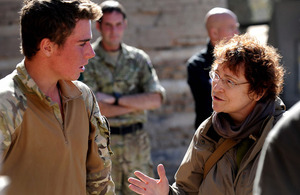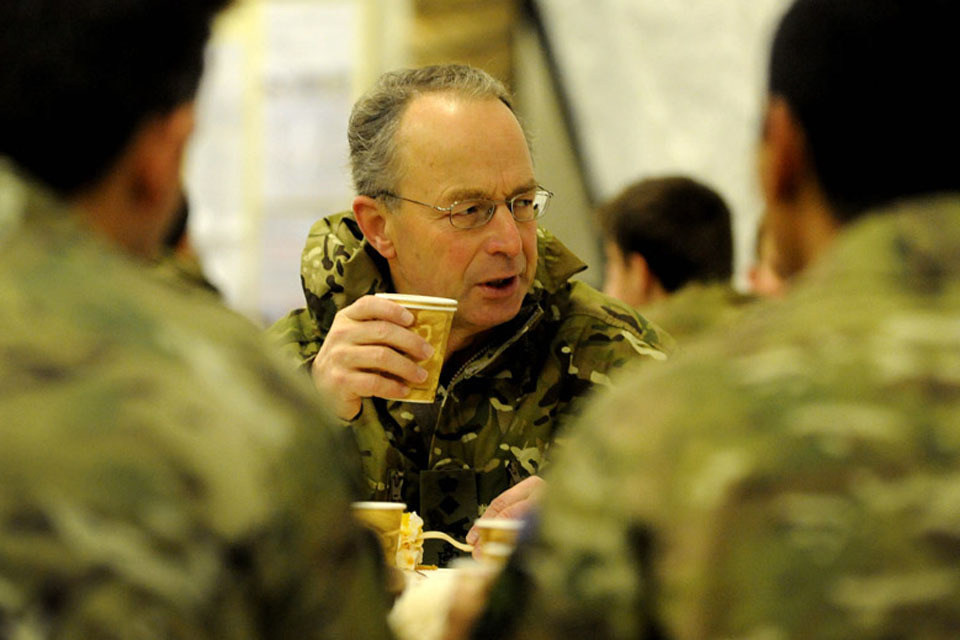PUS and CDS visit Defence personnel in Afghanistan
Ursula Brennan, the new Permanent Secretary (PUS) at the Ministry of Defence, and General Sir David Richards, the new Chief of the Defence Staff (CDS), have visited civil servants and military personnel serving in Afghanistan.

Permanent Secretary Ursula Brennan talks to Private Stuart Chamberlayne, from D Company, 3rd Battalion The Parachute Regiment, about his experiences in Helmand province [Picture: Sergeant Rupert Frere RLC, Crown Copyright/MOD 2010]
In her first visit to the front line of operations since taking the top job at the Department last month, Mrs Brennan conducted a whistlestop tour, taking in main operating bases as well as smaller, more remote locations where her staff are deployed.
Joined by her military counterpart, the Chief of the Defence Staff, General Sir David Richards, the aim of the trip was to meet as many civilian and Service personnel working in as many different roles as possible.
The civil servants who the Permanent Secretary met are mostly serving operational tours of between six and 12 months, with the roles represented as diverse as scientists, police officers, commercial officers and communications specialists.
Beginning their trip in the Afghan capital Kabul, from where the NATO-led military operation is co-ordinated nationally, the party then flew to the main operating base in Lashkar Gah.
This is where the headquarters of Task Force Helmand, the lead formation of British troops in Afghanistan, is based, as well as the Foreign Office-led Helmand Provincial Reconstruction Team, which employs both civilian and military personnel and exists to promote economic and social development in the province.

Chief of the Defence Staff General Sir David Richards has breakfast with troops in Lashkar Gah [Picture: Sergeant Rupert Frere RLC, Crown Copyright/MOD 2010]
They then travelled on to Camp Bastion, also in Helmand province and the largest British base in the country, stopping off at the smaller Forward Operating Base Shawqat and the even more remote Patrol Base Attal on the way.
The Permanent Secretary also visited her Afghan opposite number, the Afghan Ministry of Defence’s First Deputy Minister, and dropped in on a group of Afghan students taking the civil service training programme.
The course, taught by UK trainers who are preparing their Afghan equivalents to take over their roles, covers all the key skills new Afghan civil servants will need, including negotiation skills, leadership and the Civil Service Code of Conduct.
One of the key roles of British forces serving in Afghanistan is training and mentoring the Afghan National Security Forces, which will allow the process of ‘transition’ - the handing over of security responsibilities to the Afghans - to take place.
So Mrs Brennan and General Richards were shown around the Helmand Police Training Centre, where civilians from the Ministry of Defence Police and troops from 5th Battalion The Royal Regiment of Scotland are involved in training up the next generation of Afghan police.
The Permanent Secretary has visited Afghanistan twice before in her previous role as 2nd Permanent Under Secretary at the Department, and noticed significant changes since her last trip.
She said:
What is really striking on my third visit to Afghanistan is the progress that’s been made and the focus on transition. I’ve been really struck on this visit by the civilian-military effort that’s going on and by the enormous improvements that are being made through the use of advanced technology that are really enabling the troops on the ground.
Whilst here, I’ve seen the Provincial Reconstruction Team [PRT] in Helmand. It’s really good to hear General Petraeus say that it’s the best PRT in Afghanistan. The range of talent that they’ve drawn together there is absolutely remarkable and it’s one of the real strengths of the PRT. It’s real evidence of the professionalism of civilians and military working together.
General Richards said:
I’ve never seen the Armed Forces so motivated and capable as it is today, and that has been summed up perfectly on this visit. You judge Armed Forces on the basis of whether or not they can do the job they are being asked to do and, my goodness me, this is an Armed Forces that’s at the top of its game.
MOD staff who met the Permanent Secretary were pleased to see the Department’s two top people make the trip out to Afghanistan, particularly at this time of significant change in Defence.
Dr Eluned Lewis, who is based in Lashkar Gah as the Deputy Scientific Advisor to the UK military, said:
For the Permanent Secretary to take time out of her busy schedule to visit MOD civilians in theatre was a very welcome gesture. She showed genuine interest in the civilian effort in Afghanistan and made me feel that my work here is supported and appreciated at senior level.
She welcomed our questions and comments and answered with honesty and compassion. She was very approachable and down to earth, and I was very pleased to have the opportunity to meet with her. I hope she relays a positive message back in London about the civilian effort in supporting operations.
Ben Wilkinson, who is deployed as the Civilian Media Advisor at Headquarters Task Force Helmand, said:
In a climate in which it’s not uncommon to hear very negative comments, dismissing all MOD civil servants as pen-pushers who spend their days stuck behind a desk, I thought it was valuable and a significant morale-boost to see the top civilian in the Department come here and show a genuine interest in the roles we play - all of which contribute to the operation.
The Permanent Secretary seemed very interested to hear what we thought about cost-savings measures being implemented at the moment and took a lot of time to explain the rationale behind them, how they are working, and how they might affect us. She was also keen to hear our views on the future shape of the MOD and how things could be done more effectively and efficiently in the future.
Edward Holder, Policy Advisor to Commander Task Force Helmand, said:
I am finding my deployment to be both professionally and personally rewarding; however, like most of us out here, I am concerned about the future opportunities for working in a post-Strategic Defence and Security Review MOD.
The meeting we had with the Permanent Secretary was useful in getting a clearer idea of what to expect in the coming months and how the MOD is likely to be structured in the future. The shortbread biscuits that she brought with her were an unexpected bonus!